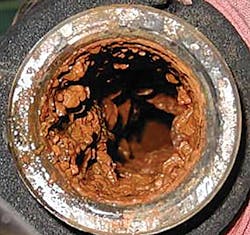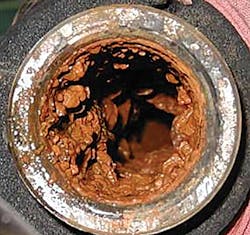Antimicrobial Technologies
Ensuring Safe, Sustainable Use
As major shifts in global temperatures have had an adverse effect on water supplies in arid and semi-arid regions across the world, water is fast becoming one of the most valuable and precious resources today. With that, the importance of microbial control technologies in safeguarding water supplies is becoming increasingly evident.
According to the United Nations (UN), 1.6 billion people, or almost one quarter of the world’s population, face water shortages. Access to clean water has therefore been identified as one of the UN’s sustainable development goals. This year in Europe, the European Commission proposed new rules to stimulate and facilitate water reuse in the EU for agricultural irrigation as part of its Circular Economy Action Plan. Meanwhile in the United States, several states have developed action plans to address water shortages.
Pipe clogged by biofilm formation.
Microbial control technologies provide a central solution to this challenge, as they help keep clean the storage tanks, pipes and filters through which the water flows. If microbes were not eliminated with biocides, effects associated with biofouling like corrosion and slime formation would lead to millions of cubic meters of contaminated water. In addition, more energy would be required to move the supplied water through pipes and filters clogged with biofilm.
Antimicrobials allow for access to clean drinking water but also facilitate the reuse and treatment of water in industrial settings that would otherwise cause serious operational problems. The water that recirculates in cooling systems can often become contaminated with bacteria, algae, fungi and protozoa that lead to the formation of biofilms (or slime). If untreated, slime can lead to operational inefficiencies, microbial-induced corrosion (MIC), and can potentially harbor harmful micro-organisms. Without the technologies that inhibit microbial growth, the operating conditions found in typical systems, such as temperature, pH, sunlight, aeration and nutrient level in makeup water, would be compromised.
The benefits of antimicrobial technologies cannot be overstated. However, many of the substances used for microbial control purposes are regarded as hazardous, which is unsurprising given the fact that they are intended to control a wide variety of harmful or unwanted organisms. It is important that safeguards are followed to ensure antimicrobial technologies are used without causing harm to people, the environment or animals. When handled and used correctly, they can safely provide significant benefits to society.
It is the role of the Microbial Control Executive Council (MCEC) to ensure that the safe use of microbial control technologies is promoted and accurately communicated. The MCEC is made up of six of the world’s leading developers of microbial control technologies: LANXESS, Troy, Lonza, Dow, BASF, and ICL. MCEC is a sector-group of Cefic, the European Chemical Industry Council (EU Transparency Register: 64879142323-90) and has been active in providing valuable and up-to-date information to industry and policymakers since its foundation. The organization’s aim is to engage with the scientific community and wider industry to provide easy-to-digest information on microbial control and taking a responsible approach to the sustainable use of antimicrobials.
Microbial control technology has evolved considerably over recent years and the products used are required to meet very strict safety and environmental standards. The MCEC members provide a united front when it comes to promoting a responsible approach to meeting and upholding the regulatory requirements set out by the EU’s authorities.
The science and the industry behind microbial control technologies face a number of challenges and opportunities in light of the EU’s Biocidal Products Regulation (BPR). The BPR aims to provide the highest degree of protection for humans and the environment and, as such, the appropriate development, technological advancement, and sustainable use of microbial control technologies are at the core of MCEC members’ commitment to society and the betterment of our well-being. To that end, microbial control technologies are the subject of extensive research, testing and registration.
Given the lengthy nature of the EU application process, MCEC places particular emphasis on the importance of authorities’ conclusions being strongly based on sound science. Recently in Europe there have been various trends that have had an impact on the way in which chemicals have been regulated in general. A principle of precaution has been driving activities and decisions, and a hazard-based approach has become more common in Europe to the detriment of a realistic risk-based approach.
The MCEC has therefore made it its aim to provide accurate and helpful information to policymakers and the scientific community, highlighting the benefits and safe use of biocides to ensure future decisions are made based on scientific evidence rather than political pressure. The MCEC does this by communicating its message in a number of different ways. Primarily this is carried out through online engagement and through attending industry-led events. Via these channels, the MCEC provides comprehensive and convenient information on how microbial control helps us create a healthier and safer environment, and improves our world, especially with regard to precious water resources. IWW
To learn more about the safe and sustainable use of antimicrobials, please visit the Microbial Control Information Center at www.microbial-control.com.
Circle No. 138 on Reader Service Card

